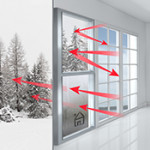Reduced Costs, Maximized Comfort; with Energy-Efficient Nano Glass
About one-third of the energy used in buildings escapes through windows, so efforts are being made today to reduce energy losses. Technological advances have greatly improved the methods of overcoming the shortcoming of the area. Energy-controlling glass or low emissivity glass is an energy-efficient solution that has a heat transfer coefficient much smaller than that of ordinary glasses and acts as transparent thermal insulation.
- 2019-08-27
- 2303

Smart Glass Windows with Nanotechnology
Energy controlling glass controls energy transmission through conduction and radiation simultaneously and makes glass into an extremely effective element to reduce energy consumption, increases brightness, and provides visibility in the building, enhances the beauty of the façade while maintaining visible light transmission. These types of glass windows implement the idea of building with large windows that bring light and beauty of the surroundings into the building.
Kaveh Glass Industrial has been able to produce energy controlling glass called EcoStar and EcoStar Plus using nanotechnology and receive a NanoScale Certification from Product Evaluation Unit of Iran Nanotechnology Innovation Council (INIC). EcoStar and EcoStar Plus products are industrially manufactured and currently available in the market.
EcoStar and EcoStar Plus Features
EcoStar Glass
Kaveh's EcoStar Glass is a colorless energy controlling glass that is produced by the soft coat method. The metal oxide coating is deposited under vacuum conditions on the glass surface by a sputtering method and this coverage reflects short and long IR waves.
The appearance of EcoStar Glass is like ordinary double glazed windows and performs the same function in both light reflection and light transmission modes.
It can enhance the performance of Kaveh’s EcoStar Plus by using it with other types of glass to create sound insulation, safety and security, decoration and privacy insulation.
The heat insulation of EcoStar double glazed windows are up to three times more efficient than ordinary double glazed windows and this feature offers many advantages such as preventing heat loss, reducing the environmental impact of energy consumption to provide heating and avoiding condensation during the cold seasons of the year.
Also, given that this type of glass is more than twice as efficient as ordinary glass windows for blocking the sunlight heat, it has advantages such as greater thermal comfort in the summer and lower costs for cooling facilities. In addition, these types of glass block the entry of solar ultraviolet radiation.
Laminating of this glass can be done in custom dimensions.
EcoStar Plus Glass
EcoStar Plus Low-E is manufactured by deposition of one or two silver layers on the glass surface under vacuum condition and with nanotechnology.
Standard clear glass has an emittance of 0.84 over the long-wave portion of the spectrum, meaning that 84% of the long-wave radiation striking the surface of the glass is absorbed and only 16% is reflected; but Low-E glass coating has an emittance as low as 0.04. Such glazing would reflect 96% of the incident long-wave and infrared radiation, it would allow most visible light through, but would block all other portions of the solar spectrum, including ultraviolet and near-infrared radiation and minimize summer heat gains. Low-E coatings on EcoStar Plus glass, by reflecting infrared energy would reduce the absorbed or lost heat of the building through changing the direction of the heat radiation.
EcoStar Plus glass products keep the best balance between passing through visible light and controlling the sun’s energy and they have the highest visible transmittance compared to the ordinary reflex coatings.
This product is used in a variety of demanding applications, including commercial buildings (office, hotel, shopping center, airport, etc.), light-absorbing spaces such as greenhouses that require low light or solar reflectance and also residential buildings and all structures that need the use of safety or security glass windows.
The EcoStar Plus glass with its energy-saving stability guarantees warmth in winter and cold in summer and is a great choice for hot and cold climates. Considering the high energy-efficient low-E coatings increase building efficiency by reducing energy consumption, this industry has a high return on investment in the future.
Know More about the Activities of Kaveh Glass Industrial Group
Kaveh Glass Industrial Group has designed and manufactured various glass products in the form of three companies: Kavian Float Glass, Asa Float and Kaveh Float Glass.
Kaveh Glass Industrial Group with three advanced production lines of nano-coated glass has been successful in creating direct employment for more than 1,200 people and because of the complete portfolio of these products, it has considerable competitive potential in the market.
With the implementation of the new Damavand Float Project in Kaveh Industrial City (Saveh), the production lines of these products in Kaveh Industrial Group would increase from 3 to 4 production lines.
Kaveh Float Glass Company was founded in 2,000 with a surface area of 12 hectares and a built-area of 77,000 square meters in Kaveh Industrial City. In this complex, all basic and detailed engineering operations have been carried out by competent experts and engineers of Kaveh Glass Industrial Group. The production capacity of this plant is 220,000 tons of float glass per year.
Kavian Float Glass Company and Asa Float Company have also been established in 2009, each of which has a production of 50,000 square meters of plain and colored glass per day. In later stages, these glasses will be converted into a variety of reflex glass and double glazing laminate mirrors.
Each of these complexes has an advanced production line of nano-coatings for glass surfaces.
Kaveh Glass contracting companies for using the nanotechnology-based products are about 260 domestic and foreign companies and the total sales of the three companies of Kavian, Asa Float, and Kaveh Float also averaged over 55 million square meters per year. This figure can vary depending on the customer’s request.
For more information about the products of Kaveh Glass Industrial Group, please visit the company’s web site at Iran Nanotechnology Innovation Council database. (www.nanoproduct.ir)
